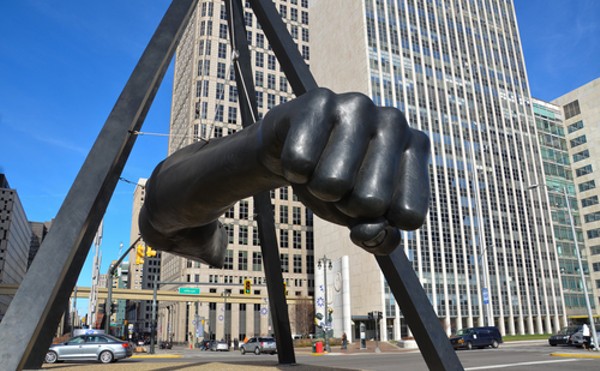At the end of Kwame Kilpatrick's lengthy interview in the most recent issue of Don Diva Magazine — "the original street bible" with a "Parental Advisory Gangsta Content" label — there is a plug for the ex-Detroit mayor's upcoming memoir.
The blurb promises that Surrendered will reveal "the truth behind his meteoric rise in politics, the crippling controversies surrounding his administration, his downfall and, ultimately, his redemption."
Now, we admittedly have only a passing familiarity with the theological concept of redemption, but it seems that a fundamental part of the process has to do with actual reform. You know, admitting to wrongdoing and deciding to change your ways.
The problem with that claim when it comes to Kilpatrick is that the guy is as truth-challenged ever. Just as we're not theologians, we're also not psychiatrists. But if KK isn't a textbook example of a pathological liar, then we'll eat a hardcover copy of Sigmund Freud's collected works.
The Don Diva interview — a few pages after the tastefully dubbed "Sticky Pages" featuring photos of buxom, scantily clad babes — contains everything from self-serving embellishments to full-blown whoppers so bizarre they had us scratching our heads and wondering if there was some major part of the Kilpatrick saga that we'd actually missed.
We'll start with just a few of the embellishments, like the Kwamster's claim that he was responsible for bringing Super Bowl XL to Detroit. The reality is that the NFL made the decision to locate the big game in Motown more than a year before Kilpatrick became mayor.
That's the thing about Kwame: He may be a prolific liar, but that doesn't make him a proficient one. In fact, Chapter 1 in the Liar's Handbook clearly states that you don't prevaricate about things that are easily proven to be untrue.
Likewise his claim that he was "responsible for finishing the Riverfront in Detroit." It takes about 38 seconds to call up the Detroit Riverfront Conservancy's website and learn that work on the eastern portion of the project is, even now, only about 75 percent complete and that work on the west side hasn't begun.
Asked by the magazine what he's actually in jail for, Kwame explains:
"Most of America doesn't even know what I am in jail for. In a deposition and in a trial I was asked three questions one minute changed my whole life. The trial wasn't even about the affair. I was called to testify in an auto accident case that involved the police because people were suing the city. I was called to testify because one of the employees was someone I appointed into their position and I had un-appointed him. I was on the stand for seven hours. For one minute of that time I was asked, did I send text messages to Christine Beatty [his chief of staff]. At the time I didn't know they had all the information and I lied. I lied about sending romantic text messages to my Chief of Staff."
Where do we begin?
A car-accident case? It took us a while to figure out what could have possibly been the starting point for that leap of illogic, but then it finally came to us. One of the things that the Police Department's internal affairs unit was looking into was an allegation that the enablers on Kwame's security detail had covered up accidents they were in while driving city cars.
The truth, of course, is that Kilpatrick and the city had been sued in a whistleblower case brought by two cops who claimed they were retaliated against for looking into activities concerning the mayor and his cronies.
As far as lying about sending text messages to Beatty, what KK lied about was having an affair with her. He also lied about not firing Gary Brown, the former head of internal affairs and one of the two cops who brought the whistleblower suit.
Asked why he was sent back behind bars following an initial 99-day stint in Wayne County Jail after pleading guilty to two felony obstruction of justice charges (and, lest we forget, a no contest plea to the charge he assaulted a Wayne County sheriff's deputy), Kilpatrick does some mighty spinning.
"I filed a motion stating that I was not going to be able to continue paying restitution of $6,000 a month. I was paying restitution before I was paying my taxes, my kids' lunches and my bills."
The reality is that Kilpatrick was hiding hundreds of thousands of dollars from the court in an apparent attempt to avoid restitution payments. As to lunch money, court records showed Kilpatrick was renting a $1 million dollar home in Dallas, and shelling out thousands of dollars for his wife Carlita's plastic surgery.
"Frankly, your continued attempt to cast yourself as the victim, your lack of forthrightness, your lack of contriteness and your lack of humility serve to affirm that you have not learned your lesson," the judge said at the time he sentenced Kilpatrick to 14 months to five years in prison.
Much more is revealed in this unintentionally enlightening magazine interview. For instance, SkyTel, the company that turned over those damaging text messages to lawyers for the whistleblowers, has "admitted that they were wrong" after he filed a $100 million lawsuit claiming the company acted "illegally" when it released the texts and "ruined a whole lot of lives."
That's right, the release of the messages — and not all the underlying actions that they, in part, revealed — ruined people's lives. But the company, far from conceding wrongdoing, continues to seek to have Kilpatrick's federal suit dismissed.
We could go on but we'll focus instead on what's next for the big man.
Among other things, Kilpatrick — set to be released this month — says that he is thankful because prison provided "insight" he would have otherwise missed out on. Now, he says:
"I want to educate people about the tremendous flaws that exist in the criminal justice system and how it has created a tremendous crisis in our communities around this country. The mass incarceration in this country is creating a permanent underclass in this society."
After all this time, Kilpatrick is still claiming that a root cause of all his problems is white America's, as he puts it, "fear of the Blackman." If only he hadn't been so big and imposing, hadn't worn the diamond stud earring and alligator shoes, if only he had been submissive and gone along easily, the scrutiny would never have been as intense.
Kilpatrick, even now, continues to play the race card. And the damnable thing about that is the injustice to real victims of racism.
Unfortunately for him, Kilpatrick may not have all that much time to devote himself to the worthy of a cause of drawing attention to our country's prison-industrial complex. At least not from the outside.
Last year, the U.S. Justice Department slapped the Kwamster with a 38-count indictment that accuses him of running a criminal enterprise that included bribery and extortion.
(Kilpatrick and his father Bernard Kilpatrick, along with several others named in the indictment, have proclaimed their innocence.)
If convicted, he could spend as long as 30 years in prison, leaving plenty of time to contemplate Don Diva, which, we understand, is especially popular among inmates.
As for his memoir, if it is anything like this interview, it should be placed in the fiction section.





